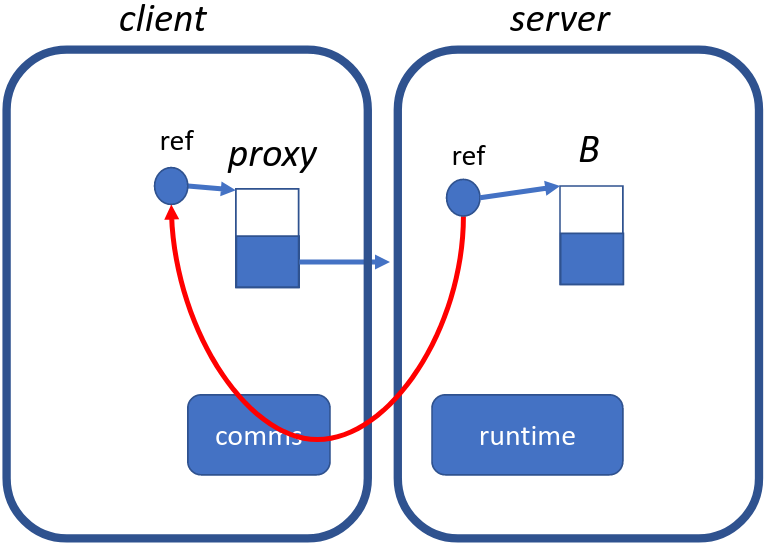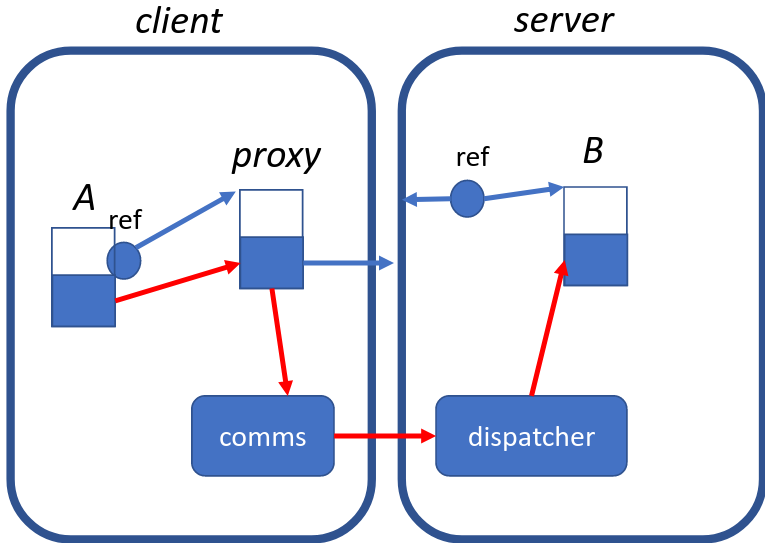4. RPCs & RMI
14/02/23
Remote Procedure Calls
- Concept that programmers should be able to invoke remote operations in the same way as local procedure calls
- The starting point is the programmers perspective
- Three key considerations; Interfaces, Semantics, Transparency
Programming with Interfaces
- Many languages support modularisation with programmer-defined interfaces. Defines a public contract
- Code external to the module can only use things in the interface. Need to understand the interface, not the implementation
- A module can be replaced by another with the same interface and nothing else needs to be changed
Local vs Remote procedure calls
- Different modules may be running in different processes but can still have defined interfaces
- Not normally possible for code in one process to access variables in another process. Single machine blocks of shared memory can be created to share variables between processes
- Call by reference parameter passing is not possible between processes over networks
- A reference or pointer is not meaningful in another process
- Reference = an address in local process memory
- Parameters need to be clearly identifiable as passed to the procedure (in), returned from it (out) or both (inout)
Interface definition languages (IDLs) - Interfaces defined using a language built-in interface.
CORBA IDL Example
// In file Person.idl
struct Person {
string name;
string place;
long year;
};
interface PersonList {
readonly attribute string listname;
void addPerson(in Person p);
void getPerson(in string name, out Person p);
long number();
};
RPC call semantics
- Local procedure call semantics are always exactly one
- Remote procedure calls can have different semantics
- Maybe semantics - executed once or not at all
- At-least-once semantics - the caller receives a result or an exception is raised
- At-most-once semantics - the caller receives a result or an exception is raised
Transparency
- RPCs are a good example of access (and location) transparency
- In practice is often limited. Remote operations can fail in more and different ways. Also typically slower
- Most RPC systems will strongly resemble local procedure calls but with some additional elements
Summary
- Remote Procedure Call paradigm is the concept that programmers should be able to invoke remote operations in the same way as local procedure calls
- RPCs are typically defined as an interface, perhaps expressed in an interface definition language
- RPCs differ from local calls because memory is not shared between the caller and the procedure body
- RPCs are also much slower than local calls and subject to network and server failures
Remote Method Invocation
- Applies the concept of RPC to distributed objects
- Same as RPC in terms of interfaces, call semantics and transparency
- Also allows object-oriented concepts to be used
- Also allows references to objects to passed over the network, giving more options for parameter passing
Distributed Objects
- Since each object encapsulates its own state, different objects in the same system can be hosted by different processes
- Adopting the client-server paradigm, invoking a method on an object in another process is a RMI
- A remote object reference represents a particular object anywhere with a distributed system
- A remote interface specifies which of an object methods can be invoked remotely
Implementing RMI
Remote reference to B must identify both the process and the specific object. If passed to another process will create a proxy object in that process

Object A (in the client) makes a local method invocation on the proxy. The process hosting the original object has a shared dispatcher for the objects it hosts

Summary
- RMI extends this concept to distributed objects
- A remote reference represents a remote object (Including server process host and port, and a specific identifier for the object)
- A remote object is represented by a dynamically created proxy object
- A dispatcher in the server process passes network requests to the original object
Java RMI
- Java-specific RMI middle-ware, and specific to the Java language.
- Many similarities with other distributed object systems (COBRA)
Remote interfaces in Java RMI - Defines using Javas interface mechanism. However has to extend java.rmi.remote and throw a RemoteException. Arguments and return values must be serialisable
Serialisable vs Remote
- Primitive types - converted to a standard external representation and sent to the other processes
- Instances which implement
java.io.Serializable- converted to a standard external representation (send a copy) - Instances which implement
java.rmi.Remote- Causes a new remote reference to be created and sent (send a remote reference)
Implementing a Remote Object - Each remote interfaces needs an implementation that will be run in the server process. Implementation extends java.rmi.server.UnicastRemoteObject and constructor throws java.rmi.RemoteException
RMI Registry
- RMI provides a standard broker application called the rmiregistry
- Remote objects are identified using URL-like strings
- Before a remote object can be found its hosting process must register it using
bindorrebind - A client can then
listregistered objects and/or obtain a remote reference to a registered object with lookup
Summary
- Java RMI is a Java-Specific RMI middle ware
- A remote interface is a java interface that extends
java.rmi.Remote- Interface can either be primitive, serialisable or remote
- Extends
java.rmi.server.UnicastRemoteObject - When a reference to a remote object is passed to another process the runtime system creates a proxy object in the new process
- The Java RMI registry provides a standard broker facility to locate remote server object via the Naming interface